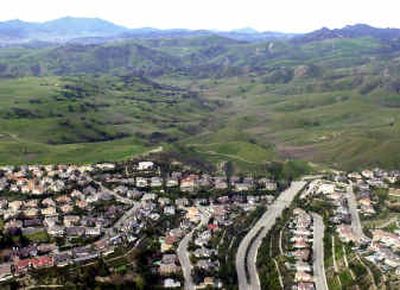California program offers incentives to keep forests

SACRAMENTO, Calif. – California has become the first state to reward landowners for leaving forests standing to help control global warming, under a program adopted this week by the California Climate Action Registry.
The voluntary program promotes conservation, improved timber management, and reforestation to keep carbon dioxide in trees and out of the atmosphere, where it’s the most abundant greenhouse gas.
California loses about 60,000 acres of forest to development annually. Because healthy trees store carbon dioxide but release it when they’re destroyed, the forest loss is equivalent to 2.5 million new cars going on the roads every year, said Laurie Wayburn, president of the Pacific Forest Trust.
The state’s Climate Action Registry, created by lawmakers four years ago, set up what amounts to an accounting system to measure carbon dioxide storage in timberland. Tracking storage levels is crucial to an emerging commodities market in which carbon credits are traded as part of greenhouse gas control efforts.
Other states now are looking to California’s model, said Wayburn, whose group helped develop the program.
Worldwide, forest destruction is the second-leading cause of carbon dioxide behind fossil fuels, said Wayburn.
A law two years ago required the state to create incentives for industries that protect forests to offset carbon dioxide pumped into the atmosphere. More than 40 companies, cities and government agencies track their emissions through the registry.
The guidelines require that forests have to be managed beyond existing requirements to qualify for emissions credits, and must be permanently preserved as forest land through such things as conservation easements.
The plan should aid the state’s beleaguered timber industry, said Clark Binkley, chief investment officer for Hancock Natural Resource Group, the nation’s largest timber investment management organization. Half the state’s forest land is privately owned, and the state Board of Forestry endorsed the idea in August.
Terry Tamminen, secretary of the California Environmental Protection Agency and chairman of the registry’s board, issued a statement urging other states to follow California’s lead. The program will benefit not only air quality, but water quality by protecting vulnerable watersheds, he said.